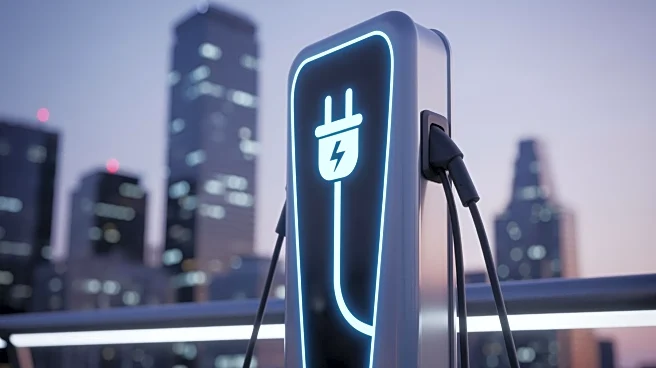What's Happening?
Rivian has announced a substantial performance-based compensation package for its CEO, RJ Scaringe, valued at approximately $4.6 billion. This decision comes shortly after Tesla shareholders approved a similar
compensation plan for their CEO, Elon Musk. Scaringe's package includes options to purchase 36.5 million shares at $15.22 each, which equates to about a quarter of Rivian's market capitalization of $18.7 billion. The board decided to cancel a previous grant from 2021, which they deemed unlikely to vest. This move aligns Rivian with other major players in the electric vehicle industry, emphasizing the importance of incentivizing leadership to drive company growth and innovation.
Why It's Important?
The approval of this compensation plan underscores the competitive nature of the electric vehicle industry, where companies are vying for market leadership and innovation. By offering substantial incentives, Rivian aims to ensure that its CEO remains motivated to achieve ambitious growth targets and technological advancements. This decision reflects a broader trend among EV companies to align executive compensation with performance metrics, which can drive shareholder value and company success. The move may also influence other companies in the sector to adopt similar strategies, potentially leading to increased competition and rapid advancements in electric vehicle technology.
What's Next?
Rivian's decision to approve this compensation plan could lead to increased scrutiny from investors and analysts regarding the company's performance and strategic direction. As the electric vehicle market continues to expand, Rivian will need to demonstrate significant progress in its production capabilities and market penetration to justify the substantial compensation package. Stakeholders will likely monitor the company's quarterly earnings and product development closely to assess whether the incentives are translating into tangible results. Additionally, this move may prompt discussions within the industry about the sustainability and ethics of such high-value executive compensation packages.
Beyond the Headlines
The approval of RJ Scaringe's compensation package raises questions about the broader implications of executive pay in the electric vehicle industry. It highlights the growing importance of aligning leadership incentives with long-term company goals, particularly in sectors driven by innovation and rapid technological change. This development may also spark debates about income inequality and the role of executive compensation in corporate governance. As Rivian and other EV companies continue to evolve, the ethical considerations surrounding such compensation plans could become a focal point for investors and policymakers.









